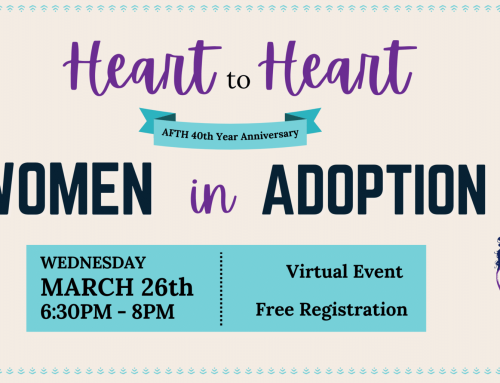Self-Concept and Social Identity Among International Adoptees
This blog is a summary of a research project that Keri Friedman, AFTH Donor Relations and Marketing Intern, wrote for her senior college thesis in social psychology.
International adoptees conceptualization of one’s self-concept and social identity can be largely influenced by many factors. Self-concept is an idea about the self, formed from the beliefs about oneself and the response of others. Broadly, self-concept illustrates the answer to the question “Who am I?” An international adoptees exploration of self-concept can be done through one’s adoptive status, cultural background, and race. An adoptees perception of self-identity and with that, social identity, is a lifelong process.
An individual’s social identity is part of one’s self-concept derived from recognized membership in a social group and who they are in terms of the groups to which they belong. A way to understand social identity is through the conceptualization of self-identity. Although self-concept and self-identity may seem similar, self-identity is socially defined; created by society with the opportunity to refine the identities that society gives to an individual. International adoptees are faced with navigating intersections of two identities, their racial and cultural identity, and the influence of Western contexts on one’s identity.
The framework that is used to understand self-identity among adoptees is derived from Baden et al. (2012) that outlines the process of self-identity that adoptees may experience in their journey through identifying with multiple identities. This theoretical approach can be used to explore identity development in international adoptees. To explore social identity among adoptees, an ethnic-racial model posed by Pinderhughes (2013) that outlines factors that influence child outcomes can be used to explore social identity. To investigate international adoptee’s social identity development, it is important to consider the role of the parent in one’s adoptive identity and ethnic-racial socializations. These theoretical frameworks and models can then be used to examine the intersection of both self-concept and social identity and the implications for an adoptees educational experience, focusing on socialization with teachers.
As mentioned before, familial support and ethnic-racial socialization are important factors in an adoptee understanding their self-concept and social identity. An adoptees sense and understanding of self in environments and communities where they feel comfortable to embrace their adoptive status, cultural background, and racial identity, can positively influence an adoptees socialization and interactions in various contexts. However, because there are many contexts that adoptees face throughout life, they may face some challenges in some contexts. One social context that an adoptee may face challenges is in educational contexts, schools, or learning programs.
The existing literature and research on adoptees in schooling environments is limited and often yields conflicting findings on its implications for the well-being of children (Thomas, 2016). One perspective indicates that adopted children experience social and developmental disadvantages compared to their non-adopted peers while another suggest that implications of adoption status infer adoptees do not experience systematic socioeconomic disadvantages compared to other children (Thomas, 2016). These perspectives argue that familial support and actions aim to mitigate biases in their children’s environment that can help eliminate disparities among children. Previous research and literature have not consistently examined whether these factors mediate the educational experiences of international adoptees, however, international children are likely to face challenges that could results in educational achievement gaps between adopted and non-adopted persons.
A factor that could impact adoptees educational experiences and outcomes is the interactions they have with the educational instructor or teacher. The teacher’s approach when talking about family relationships or background may impact adoptees social experiences and interactions with other peers when talking about family. Additionally, the level of diversity and inclusion in the classroom such as ethnic, racial, and cultural awareness can impact adoptees schooling experience. Outside of educational environments, adoptees may feel more comfortable embracing and discussing their adoptive status, cultural background, and racial identity whereas in school environments may feel more prone to not discuss certain associations with groups and identities due to the social pressures or exclusions. Adopted children benefit from social support from their wider environment and in school settings this may come from teachers, counselors, or tutors. When provided with adequate support in educational environments, adoptees socialization among peers and comfortability with embracing their adoptive status, cultural background, and race can positively aid in an adoptee’s overall educational experience.
Implications
The Children’s Bureau’s fact sheet, Adoption and School Issues, acknowledges that adopted children are often affected in two ways: educationally and socially. In Elementary school, children are increasingly more aware of their surrounding environment and the world around them. By middle and high school, children are critical thinkers and often are exposed to the concept of reproduction, family, and ancestry. Adoptees may experience issues and feelings related to their adoption when such topics are covered and discussed in class. Feelings of loss and abandonment may occur, and adoptees may become increasingly aware of the circumstances that lead their adoption.
As children become integrated into school and completing assignments, students may face challenges in doing so. An issue that an adoptee may face in the classroom are family tree or ancestry assignments and discussions. Topics like these can occur in varying degrees depending on the school year but typically involves the students to share or complete a diagram or research their family history with the class.
Assignments like this can cause additional stress for adoptees and their parents for several reasons:
- There may be limited information about their birth family
- The format does not include birth adoptive and birth family members
- Reviewing an adoptee’s family history can intensify the pain from the loss of their birth parents
- Assignments with a rigid format may cause adoptees to feel isolated and prompt uncomfortable questions from their peers.
When topics like these are covered in the classroom and in the curriculum, educators, teachers, and schools can encourage the use of positive adoption language. One way is developing a team of school personnel trained to handle issues specifically related to adoption. School districts should also provide integrated support for adoptee students. Teachers, parents, and the school psychologist can also work together to develop a plan to suit the student’s needs. Furthermore, teacher’s interaction with the adopted student can help integrate the student with the rest of their peers by normalizing the word “adoption” and “adoptee” and the concept of adoption.
Parent’s role in their child’s education can also impact their child’s educational experiences and learning. Parents advocating for their child can be important for educators to know ways to address adoption in the classroom and in assignments. Parents can ask about the possibility of sharing educational materials with the school administration or teachers to better understand an adoptee’s educational experience. Furthermore, parents can have a direct conversation with the teacher about their child’s adoption and the implications it can have on socialization with the teacher and students, completing assignments, and understanding material.
Diversity and inclusion in educational settings is highly encouraged and educators should have proper training in addressing cultural and racial differences in the classroom. As an international adoptee, educators that properly acknowledge and assess their cultural and racial background will positively impact the adoptee’s educational experience. However, addressing an adoptees adoptive status is also important in adoptees educational experience. One way to positively aid in an adoptee’s educational experience, educators should be aware and competent in adoption and addressing international adoptees status in and outside classroom settings. If an adopted student is facing social exclusion or struggling with socialization due to their adoptive status, cultural background, or race, it is crucial for educators to be able to support their student. Overall, support and encouragement from an adoptee’s family, teacher, and wider community can positively impact an adoptee’s experiences in social contexts.





